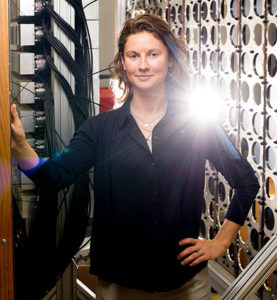Rachel Slaybaugh: The future of nuclear
Nuclear energy could be part of an effective strategy to combat climate change. Its ability to produce electricity on a massive scale with minimal emissions is why the United Nations International Panel on Climate Change recommends doubling the world’s nuclear capacity by 2050. But before these benefits can be realized, the entire industry needs an overhaul —including how nuclear reactors are designed, financed and built; how regulatory structures and energy markets are constructed; and how the new nuclear workforce is trained.

Rachel Slaybaugh, professor of nuclear engineering, is at the forefront of this work. In 2016, she launched the first Nuclear Innovation Boot Camp at UC Berkeley to inspire students and professionals from around the globe to innovate in nuclear energy. Since then, the two-week boot camp has grown into an annual event focused on nuclear engineering startups.
Slaybaugh’s own research examines the Boltzmann Transport Equation, a single equation that describes where all the neutrons are in a nuclear system. Working with the equation can be extremely challenging, so she creates algorithms and software to solve the equation faster and more efficiently. Ultimately, these methods can be applied to modeling and designing existing and advanced nuclear reactors, nuclear non-proliferation and security, as well as shielding applications.
In addition to her work on campus, Slaybaugh serves as a program director at the Advanced Research Projects Agency-Energy (ARPA-E), where her focus includes a wide range of technologies that will enable advanced nuclear reactor systems. She is also a member of the U.S. Nuclear Energy Advisory Committee and a senior fellow of the Berkeley Data Science Institute.
< Back to previous page